SUMMARY
This is AI generated summarization, which may have errors. For context, always refer to the full article.

MANILA, Philippines – Singapore’s pundits joke about being seers of election results. Even if opinion polls are banned in the city-state, Prime Minister Lee Hsien Loong’s ruling party is sure to win the vote. It always has for the past 50 years.
Still, the general elections on Friday, September 11, is the most competitive since independence as the opposition challenges the dominance of the People’s Action Party (PAP), the longest serving in the developed world. For the first time, 8 opposition parties are contesting all 89 parliamentary seats in what has been a virtual one-party state.
It is an election of firsts in a nation of 5.5 million. The polls are the first since the death of founding father and PAP stalwart Lee Kuan Yew in March, coinciding with the Lion City’s 50th anniversary. His son’s party is banking on nostalgia and euphoria to recover from the landmark 2011 polls where it lost 7 seats.
In one of the many quirks of Singaporean politics, the PAP getting 60% of the popular vote, a landslide by global standards, was considered its worst showing, and triggered soul-searching. In this election, the question is whether the younger Lee’s party can stem this decline or lose more seats to the crowd-drawing opposition.
For Southeast Asia’s economic powerhouse, the outcome is not just about votes and seats but the future of its political system, succession, and the region’s democracy and stability.

A more pluralistic system?
The PAP has been in power even before Singapore gained independence in 1965. With Lee’s iron rule, it led the city’s transformation from an island nation with no natural resources to one of the richest countries in the world. The party uniform is white, signifying incorruptibility.
Owing to its paternalistic, technocratic leadership, and a British first-past-the-post electoral system that works to its favor, the PAP has won every election in Singapore’s modern history.
The game changer was the 2011 polls. Riding on discontent over liberal immigration policies, and worries about income inequality, a strained infrastructure and the rising cost of living, the opposition won one of the multi-seat constituencies, shocking PAP and defeating 3 of its ministers. (READ: #SG50: Foreign workers less welcome in Singapore?)
This time around, the issues are similar: bread and butter concerns in one of the world’s most expensive cities as the economy weakens. Clad in blue to symbolize its connection with blue-collar workers, the largest opposition group Workers’ Party (WP) argues sharply for checks and balance, and paints PAP as elitist. Singaporeans came to WP rallies in droves in the 9 short days of campaigning. (READ: FAST FACTS: How Singapore’s parliamentary elections work)
The results of Friday’s polls will determine if the country dubbed as a “flawed democracy” will gradually shift into a more pluralistic democracy, if not a two-party state.
To prevent this scenario, Lee called for elections 16 months ahead of schedule, carefully timing it after his father’s death, and the golden jubilee extravaganza. The PAP’s secretary-general hopes to build on the vaunted third world to first world narrative, repeatedly relived in these events. It frames the vote as a a gateway to “SG100,” Singapore’s next 50 years.
Yet with the backing of young, more educated and globally exposed voters, the opposition calls for more diverse representation, and greater personal freedoms and transparency. (READ: At 50, a changing Singapore questions its miracle)
A look at some of the opposition figures shows the struggle for a more open political system. There is Dr Chee Soon Juan who returns after 15 years of enduring jail time and bankruptcy. Media reports say he was welcomed to rallies “like a celebrity.” Blogger Roy Ngerng stands for election following a defamation suit from Lee for questioning the handling of Singapore’s pension fund.
To PAP’s appeal to prosperity, WP chairman Sylvia Lim thundered at a rally: “Stability does not come from bullying, stability does not come from control, and stability certainly does not come from suing those who criticize you.”

Who will be the next PM?
Now more than ever, the election is a referendum on Lee’s leadership.
It will be a verdict not just on his government’s efforts to stem immigration, and to provide a social welfare net for poor and elderly Singaporeans in response to the 2011 vote. It is also a gauge of how well he can groom a successor in a country where the next leader is known years in advance.
A mathematician, Lee was set to succeed his father even when he was deputy prime minister to premier Goh Chok Tong in 1990.
“Lacking the high popular vote of his predecessors and facing a more challenging political environment in this age of social media, Lee is struggling to come out of the shadow of his father. The 2015 election is his election as he needs a mandate of his own,” said Bridget Welsh of the Center for East Asia Democratic Studies of the National Taiwan University.
At 63, Lee has said that he wants to turn over power before he turns 70. Welsh said that there is no clear transition path unlike in the past, a concern for the PAP base. There are many potential premiers among the young ministers but no clear contender. The Straits Times even goes as far as saying that Lee’s successor might come from the opposition.
This makes the election all the more urgent as Lee pitches for PAP candidates and what could be his successor team.
“You are voting for me, you are voting for my team, you are voting for my program,” he said in a rally.
“If you believe in me and my team, if you believe that together we can make tomorrow better than today, please support me and my PAP team.”

More ‘genuine opposition’ in ASEAN?
Singapore’s election has implications beyond the so-called little red dot.
The hot-button topic of immigration prompts the government to restrict the influx of cheap foreign labor, and to force companies to improve productivity by focusing on innovation.
With greater opposition voices in government, multinationals and companies with global headquarters in the financial hub will have to adjust even more.
On the political and security front, the PAP emphasizes the need for stability in the next 5 years, comparing Singapore with neighbors like corruption scandal-hit Malaysia, and junta-ruled Thailand. There, too, is the uncertainty in the results of upcoming elections in newly opened Myanmar this November, and Asia’s rising tiger, the Philippines in May 2015.
Beyond Lee’s warnings about ISIS and the Bangkok blast, The Diplomat believes the PAP cannot overlook the danger of the trend of weak opposition parties in Southeast Asia. Despite the controversy in Malaysia, for example, Prime Minister Najib Razak remains in power because of a fragmented opposition. Its leader Anwar Ibrahim remains behind bars. (READ: Najib remains out but what about UMNO?)
The need for a viable opposition is a message the PAP’s rivals harp on.
“We must not allow parliament to continue with one-party rule, knowing it will weaken and destabilize our country,” said WP chief Low Thia Khiang.
Observers can joke about Singapore’s predictable elections but with such high stakes, a handful of seats are no laughing matter for the nation’s leaders and citizens. – Rappler.com
Add a comment
How does this make you feel?
There are no comments yet. Add your comment to start the conversation.